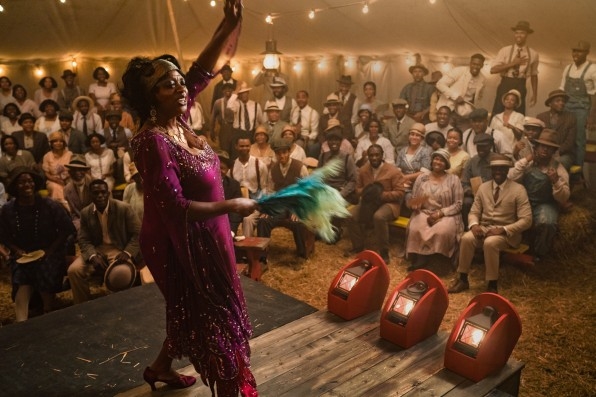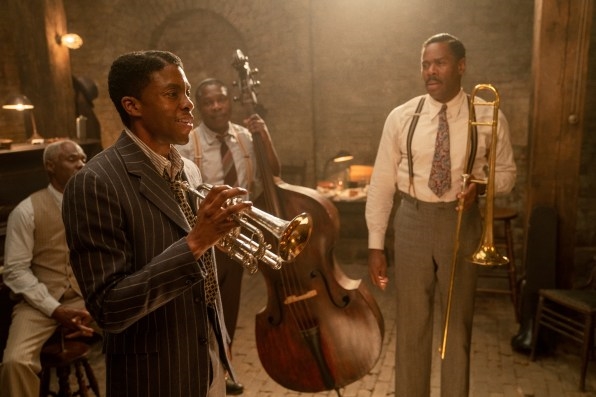When adapting the works of celebrated playwright August Wilson, you’d be hard-pressed to find someone as studied in the subject as Ruben Santiago-Hudson.
Throughout his 45-year career, Santiago-Hudson has either produced, directed, or acted in all of Wilson’s plays, which has earned him a Tony nomination (Best Direction of a Play for 2017’s production of Jitney) and a win (Best Featured Actor in a Play for 1996’s Seven Guitars). To boot, Santiago-Hudson was also fortunate to call Wilson a friend for more than two decades before the playwright died in 2005.
“Many people feel that I’m one of the preeminent interpreters of his work,” Santiago-Hudson says. “Through our extraordinary conversations, I understood his philosophies and the way that he thought and things that were important to him.”
So it’s little surprise Santiago-Hudson was tapped to adapt Wilson’s 1984 play Ma Rainey’s Black Bottom into a screenplay.
Directed by George C. Wolfe, Ma Rainey’s Black Bottom stars Viola Davis as the titular pioneering blues singer. Over the course of a recording session with her band at the height of her career, tensions rise to a fever pitch as the talented, yet volatile, trumpet player Levee (Chadwick Boseman) becomes a point of contention for everyone, leading to devastating consequences.
Characteristically of Wilson’s work, Ma Rainey’s Black Bottom lays bare the simple joys and complex pains of the Black American experience, which Santiago-Hudson, of course, wanted to amplify to its fullest. He just had to figure out how to do it his way, particularly in the context of Black America today.
“The first August Wilson play that I saw in 1984 was Ma Rainey’s Black Bottom at Cort Theatre on Broadway—and then here it comes full circle,” Santiago-Hudson says. “So instead of the young man that was sitting on the stairs in 1984, sneaking into the theater to watch it, I’m the man that’s empowered to translate that incredible moment in my life to the larger moment in the world’s life.”
“Everything is not sacred”
“One of my rules as a writer is that everything is not sacred, which goes totally against what I think about August’s work, because I think all of it is sacred,” Santiago-Hudson says. “So I had to treat August the way that I treat my own writing. And I had to figure out what story I’m trying to tell.”
What Santiago-Hudson landed on were subtle tweaks to Wilson’s work that empowered the characters and their decisions more so than in the source material.
For example, in the play, Ma’s manager Irvin and the recording studio owner Sturdyvant, two white men, have a conversation about the financial power of Black music. But in the film version, that dialogue lands among Levee and the rest of the band.
“I let the brother have the knowledge,” Santiago-Hudson says. “I empowered Levee with knowledge about the music industry.”

[Photo: David Lee / Netflix]
Santiago-Hudson also fleshed out the somewhat bit character Dussie Mae, Ma’s love interest. Part of the tension that mounts throughout the play and film stems from Levee and Dussie Mae’s incessant flirting despite him knowing she’s with Ma. In the play, Levee and Dussie Mae share just a clandestine kiss. However, Santiago-Hudson wanted to dial up the sexual release in the scene in a way that spotlights Dussie Mae’s agency.
“When I was writing it, George was saying, ‘Are they going to . . . .? And I said, ‘Hell yeah, they’re gonna do that.’ I wanted to empower the woman,” Santiago-Hudson says. “I didn’t want Dussie Mae to be some silly little girl that’s following around Ma. I wanted Dussie Mae to be smart and cunning. She doesn’t have a tremendous amount of lines. I empowered her by making her take over in that scene. When she decided to take his little butt, she was taking it.”
Even with Ma, a character who may not seem like she could be more empowered than she is, Santiago-Hudson was deliberate in opening the film showing Ma in full force.
“Ma Rainey comes in on page 48 of 102-page play. You know, when she comes in in my movie? Page one,” Santiago-Hudson says. “The first thing you hear is her moaning. And the next thing you know, we cut into her glory [performing on stage in a tent]. That’s where she was most powerful. Those hundred recordings that she had at Paramount Records between 1923 and 1927 wasn’t where she was most powerful. It was in the tent.”
In a way, those small moments of Black empowerment Santiago-Hudson added underscore one of the play’s themes of how unfairly Black culture is commodified by white power structures in backward deals, if a deal exists at all. It’s something Santiago-Hudson has had to contend with in his own career.
“My integrity is not for sale”
“I want Black folks to take a look at this and see what these white people are doing when they take, take, take from us and turn it into their wealth,” Santiago-Hudson says. “Certain things have no price with me. My integrity is not for sale.”

[Photo: David Lee / Netflix]
Santiago-Hudson recalls a time when he was shopping around a miniseries based on the Harlem Renaissance. He pitched it around to a streaming service and a network, and there was definite interest—with the caveat that it would be a movie instead.
“I cannot tell this story in two hours,” Santiago-Hudson says. “Roots has been done twice, but you can’t do the Harlem Renaissance once? You could do [a miniseries] when we were slaves, about how we survived and strived and thrived through all that demolition of our character and the looting and pillaging of our culture, but not when we were kings and queens [in the Harlem Renaissance]?”
“You could see the look in their eyes like, ‘Get him outta here,’” Santiago-Hudson recalls. “If they had a bouncer, you would’ve heard my ass hitting the floor.”
Working on a film like Ma Rainey’s Black Bottom is more than an obligation stemming from how close Santiago-Hudson was to Wilson: It’s the kind of story he wants to help usher in for a new generation. “Those stories that show us as whole, complete human beings with all the frailties and power and magnificence and anger and pathos and pain and laughter that everybody else gets to show.
“There’s no other thing that I love more than telling the whole real stories about my people and all their glory,” Santiago-Hudson says. “Other than my family, it’s the primary thing in my life: telling our stories and making us whole and complete.”
Fast Company , Read Full Story
(59)